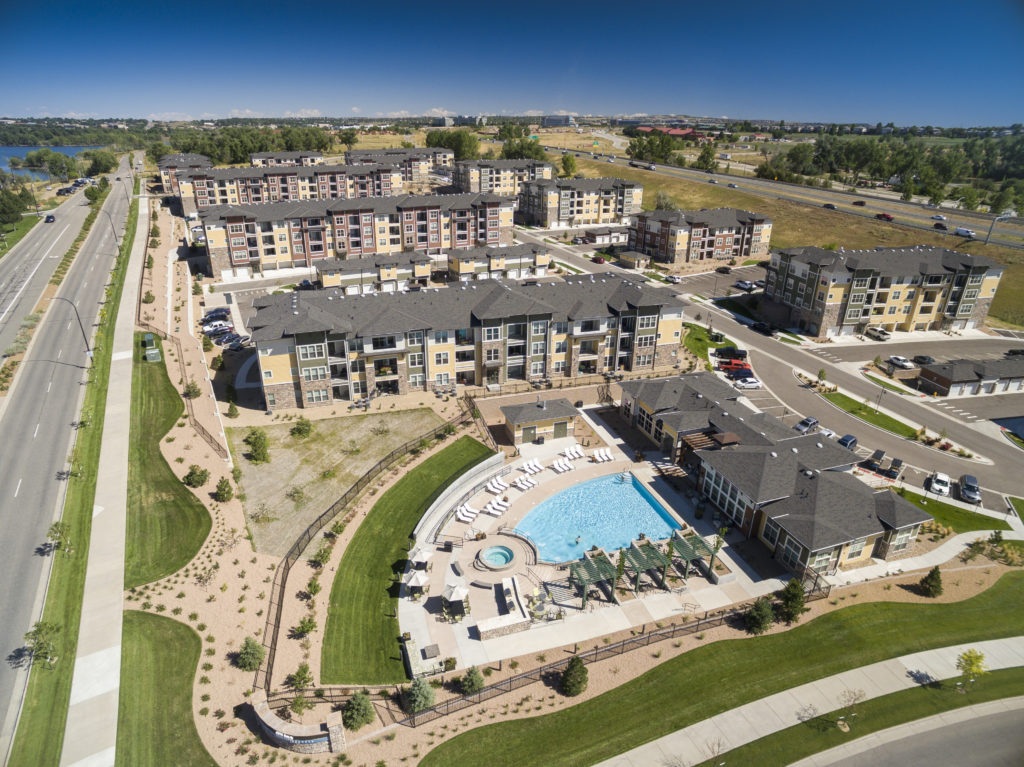Cost efficiency and optimized return on investment are two primary reasons developers opt for garden-style construction projects. What are other advantages, and how can developers overcome challenges associated with this product type?
Benefits of Garden-Style Construction
Developers often prefer garden-style construction over high-density infill projects. Here are some reasons why.
- Cost-savings are realized because many features required for high-rise apartments are not necessary with garden-style construction. For example, elevators are not needed. Money saved can be used to provide other amenities that will yield an appropriate price per unit.
- As a result of flexible phasing and sequencing options, developers can lease finished buildings while construction continues, allowing revenue to be generated sooner.
- Particularly in suburban areas, where there are often larger tracts of land for sale, flexible site layouts mean projects can fit nearly any land site.
- Garden-style campuses offer easy access for residents. Most units are only steps away from the parking area. Furthermore, this project type offers slightly larger average unit sizes, which is becoming highly sought after as more employees work from home.
When planning a garden-style project, understanding potential pitfalls can help avoid delays. To reduce risk, consider involving a commercial contractor early in the design and planning phase. Additionally, engaging all project stakeholders and promoting collaboration amongst team members is invaluable. To help you prepare, here are five factors to consider when planning a garden-style construction project.
1. Plan for Multiple Permits
The permitting process can be unpredictable. Allowing sufficient time for permit processing can mitigate potential schedule delays. One effective strategy for managing the permit process is to apply for permits based on the phasing/sequencing plan for the project. This approach provides greater flexibility regarding the commencement of each phase.
2. Efficient Garden-Style Project Phasing
Garden-style construction projects are generally completed in phases. However, determining which of these phases is completed first is important for forecasting revenue and creating a quality customer experience. Here are a couple of considerations for effective project phasing:
- First impressions are important, which means, it’s critical to plan for the new resident experience. To avoid potential residents from feeling like they’re moving into a construction zone, consider completing the leasing office and surrounding buildings first. Phasing this section first will help future residents anticipate the look and feel of the complex.
- If you’re planning to offer amenities, such as barbecue grills or a playground area, to new residents, ensure that these are placed in an area that is finished in an earlier phase. This way, valuable amenities are available to all residents from day one.
3. Logistical Challenges
Overcoming logistical challenges is often one of the biggest hurdles of a garden-style construction project. As noted, new residents will likely be moving in while construction is continuing in other areas of the complex. The phases of the project must be planned and coordinated in such a way that:
- Mitigates the risk of having residents near construction zones. Take proactive steps, such as fencing off and clearly marking areas where residents are prohibited. In addition, ensure that points of ingress/egress are easy to access and navigate.
- Minimizes construction noise. Develop a communication plan to inform new residents regarding planned construction work hours. This advanced notice can reduce the impact of any construction related activities.
- Provides residents access to any amenities they need to live comfortably. These might include the pool, fitness center, business center, etc.
4. Coordinating Site Work
Unlike high-rise construction, garden-style projects generally begin as a blank canvas. Access to utilities — water, electricity, and sanitation — will likely be new. Unfortunately, site work is one of the phases in which there is notoriously a hurdle or two. An unexpected environmental issue at the site, the discovery of old pipes and lines, and weather conditions are just a few examples.
The site work for your utilities must be planned carefully and coordinated. Our team recommends having an individual with knowledge of the project who can handle communication with the city and other coordinating firms. Designating a point person can help manage everyone’s expectations and coordinate the various scopes of work.
5. Optimize the Customer Experience
Setting expectations is the most important aspect of the customer experience. Clear communication to future residents, regarding what to expect and when, helps to improve their overall satisfaction with their new unit.
Set a schedule and inform residents immediately of any delays. This is especially important if valuable amenities are affected or access to areas such as parking, is disrupted.
Collaboration is Key to a Successful Garden-Style Construction Project
Lack of coordination and effective planning can increase the costs of your garden-style construction project by 10 to 12 percent. Having a commercial contractor on board right from the beginning — while the project is still in its planning phases — is one of the most effective strategies.
MPC’s United Project approach can help your project stay on-schedule and on-budget, as well as provide the quality-of-life residents expect. Our team can help address all the issues above, as well as several others that can arise during the project lifecycle.
For a free initial evaluation of your project, contact MPC. Our team can be reached in Colorado at 303-926-4949, or in Texas at 512-549-4966.










